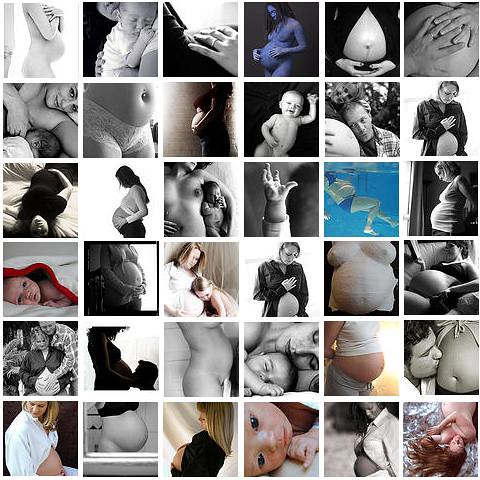How to really help your wife through pregnancy - fatherhood tips
An essay for men who are soon to be dads.
It is usually at about the ten week mark, right about when the hormones start to take control of your wife, that an unusual amount of complaints are beginning regarding your lack of involvement in this pregnancy. Questions like, "Why don't you help me?" and, "Can't you do anything?" pummel the poor man who is caught on his heels. While this catches most men off guard -it does come rather suddenly- we as men and fathers must be prepared to fill deep boots while she is pregnant, and that means accomplishing our role as the male. But what is our role? I have three words for you. Cook. Clean. Concierge.
Ask any woman what they want in a man while she is pregnant. If she doesn't ask that he take a walk to the moon and breath deeply, she will undoubtedly ask for help. She is looking for someone who will make her feel like she does not have to do this by herself. Pregnant women want us to know that it is a lot of work growing a child within them, and they want to know that they can count on us to support them. So what do we do?
Here are the only three areas you have to really worry about: cooking (which is really just the art of finding food), cleaning, and becoming her extra hands. This does not mean that you should do all of the cooking and cleaning. This means that you need to be her helper by bearing a bit of the load (and the load does get bigger the more time passes). Over all you are to serve her. Trust me, the more you serve the more she will feel loved and the less you will hear about how she is second-guessing breeding with a sack of potatoes like you. I personally heard that one myself during the first pregnancy. I hope the rest of this article keeps you from ever hearing that as well.
While she was pregnant with our oldest was when my wife first honestly surprised me with a culinary request; well, two requests really. One: grapefruit... in everything. Ever had grapefruit on a salad? No, not lettuce. Egg salad. Well, neither have I, despite her insistence that it was next to ambrosia. The second: authentic Asian food. Notice I did not say anything about Mar Far. We're talking about raw fish and cooked bugs.
What do you do guys? She wants raw squid with a light grapefruit baste. What do you do? This is the first role of the man who is to be called "Dad", you cook. In more practical terms, you find food. Remember that this doesn't mean you cook every night. But offering
to make dinner three or four nights a week will certainly help her out.
Some men, like myself, enjoy cooking food. Say it with me, "BBQ." Think about it men. How many of you like the smell of a chunk of meat sizzling over fire? From medieval knights celebrating with a fat hog on a spit to Uncle Tony's famous salmon in beer, men cook on fire. The enjoyment is natural, but the skills are not. That is why I suggest the first pregnancy "tools" you should purchase for yourself are few good cooking books. Find some that are geared for the male mind and have tips on side dishes. It is the culinary rule of triangulation: one part meat, one part fruit or veggie, and one part starch. Every meal should have these three things so find a book that provides the side choice for you and save yourself the guess-work.

"Whoa, Mike," I hear from the back, "That does nothing for our squid problem." True, most BBQ's do not come with squid. This is where you hone the art of finding food. You have to be creative. For example: It is 1:08 AM and your princess wants Subway. You, in your 'I'm thinking clearly because I'm not the pregnant one' logic inform her that they've been closed for hours, and she would feel better with some rest. Unfortunately you have neglected that your partner is indwelt at the moment. She has been fighting the craving for a deli sandwich for two hours and can not fight the demon any more. Currently, due to your reply, she is in deliberation as to what to do with your eyeballs once she has plucked them from your head. Your response? Get the sandwich. Find a place that is open all night. Some grocery stores have twenty-four hour service and their deli section with have pre-made subs prepared that day and plastic wrapped for individual sale. Buy two.
For the more exotic tastes, check the yellow pages for specialty markets. You might be surprised at how many ethnic food stores are in your area. From Mexican groceries (the best place to find good tamales) to Asian markets (there's your squid), you may be minutes away from your answer.

My wife was in her 5th pregnancy month when I took this photo.
It was not until our second pregnancy that I realized how important cleaning was. Okay, so I probably just lost half of the audience. Stick with me men! This isn't that hard. She wants a clean house, and you want a happy wife. It means you get to clean. Here are a few tips.


Make a list.
Cleaning happens faster when you make a list and prioritize. Pick a room, break down the chores,
and get to it.
Ask her what she expects.
Tell her that you want to help by doing it right the first time. Chances are she will tell you exactly how she wants it done.
Don't forget the small stuff.
Guys tend to overlook the details like wiping-down the stove top after doing the dishes and dumping the trash in the bathroom. Make sure you are thorough.
Remember, you are there to be her helper, and sometimes that means donning the toilet brush.
Lastly is the role of the concierge. A concierge could also be called the Odd-Job Man. She needs it: you get it. Her socks itch: you find the soft ones. She can't reach her shoe laces: you tie them. The dog stinks: well... put him outside.
Now I know this sounds like servitude. That's because it is. She is unable to perform many of the tasks and you are. You are making your abilities her abilities. Without you she would be struggling to reach the pots in the back of the low cupboard, and wearing socks that drive her nuts. By offering your services to her you are giving her peace, and building intimacy; two things no house can have too much of.
Remember, the male's job doesn't stop at conception. And while you will undoubtedly do more than is mentioned in this short essay, hopefully you have a much smoother time after making a few easy applications to your routine.
How to really help your wife through pregnancy - fatherhood tips





























